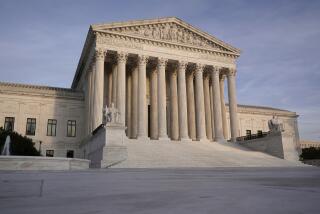Opponents Prepare Attack on Rehnquist : Rights Leaders Say Chief Justice Nominee Is Vulnerable in Senate
- Share via
WASHINGTON — The nation’s civil rights lobby, gearing up for an all-out attack against the nomination of William H. Rehnquist as chief justice, charged Wednesday that his “35-year history of hostility to victims of discrimination” makes him unfit to head the nation’s judiciary.
The leaders of groups representing blacks, women, the handicapped and ethnic minorities say they believe that the array of charges that surfaced during Rehnquist’s Senate Judiciary Committee hearing--coupled with what they view as his weak defense against them--create the possibility that the nomination could be sidetracked.
“I think if you look at his cumulative record, along with his lack of candor before the (Judiciary) Committee, you have grounds for some substantial opposition on the Senate floor,” said Ralph Neas, executive director of the Leadership Conference on Civil Rights, which urged the Senate to defeat Rehnquist’s nomination.
Scheduled for Tuesday
Debate on the Rehnquist nomination is scheduled to begin Tuesday in the full Senate, where supporters believe that President Reagan’s nominee will win confirmation with a solid majority.
“(Rehnquist) won by 13 to 5 in the committee, and we think that will carry over to the Senate floor,” said Randall Rader, a counsel to Sen. Orrin G. Hatch (R-Utah). “There’s nothing new in all this stuff. The committee has dealt extensively with this already.”
Nevertheless, the civil rights leaders released a thick packet of material on Rehnquist’s career as a private attorney, Supreme Court law clerk and high court justice--which they hope will provoke more doubts among undecided senators.
The charges include:
--As a clerk for Justice Robert H. Jackson in 1952, Rehnquist wrote memos defending the “separate but equal” doctrine that justified racial segregation and in favor of a Texas election law that allowed for “whites only” voting.
Opposed Desegregation
--As an attorney in Phoenix, Rehnquist opposed the desegregation of public housing and the public schools.
--In the elections of 1958 to 1964, Rehnquist participated in a Republican effort “to intimidate and harass minority voters,” a charge the justice has denied. The Judiciary Committee heard conflicting testimony on this point: Five witnesses said they saw or heard of Rehnquist harassing voters, while others said they were present too and did not see the future high court justice.
--As a member of the court since 1971, Rehnquist almost uniformly has voted against civil rights plaintiffs. The NAACP Legal Defense and Educational Fund reviewed 14 race discrimination cases in which the court was almost evenly divided. “In every one of these cases, Justice Rehnquist cast the deciding vote against the civil right plaintiffs,” the Legal Defense Fund said.
--In 82 of 83 cases in which the court was required to interpret a federal civil rights statute affecting minorities, women, the elderly or disabled, Rehnquist voted against the civil rights plaintiffs, the organization said.
--Rehnquist was also the only justice to uphold the Reagan Administration’s view that private segregationist academies were entitled to tax-exempt status.
Military Spying Case
--In 1972, Rehnquist cast the deciding vote to dismiss a suit against the military’s spying on opponents of the Vietnam War, even though he had been “involved in formulating the very policies at issue in the case . . . as an assistant attorney general” in the Richard M. Nixon Administration.
“The chief justice must meet the very high standards: a thorough understanding of constitutional law, an unshakeable commitment to the principle of equal justice, impeccable judgment on matters of ethics and unquestioned credibility,” the Leadership Conference said. “Judged against these standards, William Rehnquist should not be confirmed as chief justice.”
Rehnquist has refused comment on such charges. During his hearing before the Judiciary Committee, he said that the senators should judge his performance based on his 14 years on the high court.
Meanwhile, the Justice Department said Wednesday it will not permit a renewed FBI investigation into allegations that Rehnquist mishandled a trust fund for his disabled brother-in-law. Four Democratic senators sought the new probe into accusations by Harold Dickerson Cornell of San Diego that Rehnquist failed for 21 years to inform him of the trust.
Assistant Atty. Gen. John R. Bolton said the FBI had found no merit in Cornell’s accusations.
More to Read
Get the L.A. Times Politics newsletter
Deeply reported insights into legislation, politics and policy from Sacramento, Washington and beyond. In your inbox twice per week.
You may occasionally receive promotional content from the Los Angeles Times.











